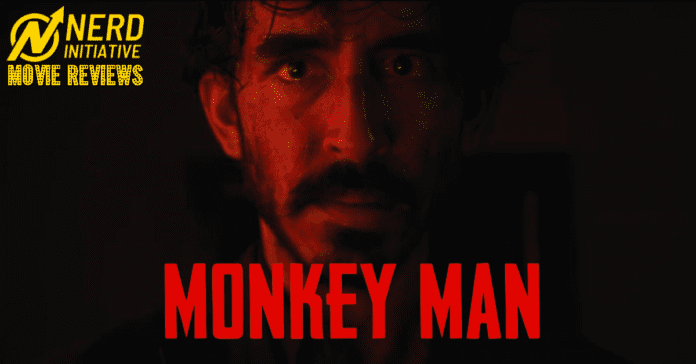Share this
Rage is an emotion that is felt by all. It’s human nature to feel enraged when mistreatment occurs whether to ourselves or those we love. It is natural to feel enraged when the person responsible for your pain keeps getting away with it. It’s reasonable to be outraged at social injustices happening to you and all around you. But how we channel that rage is the most important thing. Do we let it eat us up from the inside out for the rest of our lives? Or do we take a step forward to find the focus needed to confront the source of our anger and exact sweet revenge? Dev Patel’s new and highly anticipated film, Monkey Man explores rage in a fashion that is unlike anything we’ve ever seen before in the action genre.
Read Also: ‘The Kitchen’ Brings Us A New and Refreshing Dystopian Story
Monkey Man tells the story of a nameless man who identifies as “Kid” living in Yatana, a fictional city in India. He spends his nights fighting in underground illegal matches to earn money, intentionally losing every fight. When he obtains a lead on those who ripped his life apart as a child, he takes a job as a kitchen employee and waiter at a high end club. It’s here that he waits for the right moment to execute his revenge. Monkey Man not only stars Dev Patel as the lead anonymous character, Kid, but he wrote, directed, and co-produced the film while also performing his own stunts throughout filming.

Before we get down to business, let’s make one thing clear. This is not the Indian or South Asian version of John Wick. On the contrary, Monkey Man is a film that stands proudly on its own two feet. It serves as a colorful whirlwind of culture, religion, and sociopolitical issues propelled by human nature and our animalistic tendencies. At the core of the story is an overflowing pot of rage and pain that is desperate to be unleashed. It’s precisely what gives Kid the fuel to do the things he does throughout the film. But it isn’t all about seeing red and getting sweet revenge. It’s about gaining focus and clarity by confronting one’s source of pain and anger. Simultaneously, the social and political elements that put Kid in the position he’s in are also deeply explored.
Religion, government, law enforcement. Oppression, corruption, justice. These are all factors that play into the overall plot of Monkey Man, but some more so than others. The film is desperate to tackle several topics in one go. And while it falters a bit, this is only because each subject requires its own grand discussion. For the sake of time and story, it’s clear that Patel chose to place most of the focus on religion.

That isn’t to say there aren’t any subtle or on-the-nose references to particular social issues. Because the film takes place in a fictional city, it givers Patel ability to be creative in his worldbuilding. The film manages to incorporate diverse groups in India into the population of this city. As a result, the corruption in law enforcement and the severe oppression and mistreatment minority groups in India is displayed. Ultimately, it reflects the climate of India wherever you go. There are some folks perpetuating similar rhetoric with others protesting for better laws, rights, and protections.
On one hand, we have corrupt cops which are a driving force in the story, a common issue in India. Meanwhile, Patel includes direct references and criticisms of India’s present-day, right-winged government. And finally, non-Hindu and non-confirming minority populations in India play a major role in Kid’s journey. The negative and oppressive sentiment against these minority groups is heavily addressed, especially as it pertains to queer and Muslim communities, something that is so unheard of and rarely discussed within Indian-centric cinema.

But ultimately, it is the tale of Hanuman that takes the center stage. Alongside this mythological legend is the depiction of religion bleeding into the government. While it may prove controversial, Monkey Man takes the opportunity to expose those who influence leaders as well as though easily influenced by political leaders. The way both sides are conveyed is absolutely magnificent. But what if you have no knowledge of Hindu mythology? What if you don’t know who Hanuman is or have no clue what the Ramayana is? Trust me, you have nothing to worry about.
The film paces itself appropriately to let the audience digest what they’re watching over time. These childhood stories are broken up into fragments, much like the memories of our main character. And Much like our main character, we don’t see the full picture until the very end. It’s clear that Patel fully understands that his audience isn’t just going to be South Asian, allowing those who are unaware to be taught and hopefully, gain a newfound interest. And it just makes the parallels we see between Kid and Hanuman all the more engaging and incredible to watch as the story progresses.

But even with all the sociopolitical attributes of Monkey Man, the film remains action-packed with a unique flair. We absolutely see homages and references to so many action flicks that came before from both Asian and Western cinema. Patel has even gone on record to say that while it’s flattering to be compared to John Wick, his main inspiration for Monkey Man comes predominantly from Korean films. But even so, given the film’s heavy parallels to the legend of Hanuman, the action scenes reflect something new that we haven’t quite seen. It’s the combat of somebody who knows what they’re doing but is still quite green. And it’s not like we haven’t seen improvised fight scenes before. But Kid’s way of fighting is quite literally animalistic and monkey-like. He stays unpredictable, chaotic, and unhinged all throughout the action sequences in the film even as he cleans up his technique halfway through.

It is clear that Dev Patel is the action movie star we’ve been wanting. Despite a script that contains less dialogue than your average movie, he along with the rest of the cast are able to deliver so much emotion through facial expression and mere body language. But more so, this movie is proof that we need to let Patel write and direct whatever he wants. From the inclusion of Indian culture and the Hindu religion, to the direct commentary on social issues in India, the film strives to be unique and succeeds in doing so much more. It isn’t just a diversity story or a story centered around generational trauma. Instead, it’s one that is inspired by what’s going on around us and in turn, intends to relay a powerful message. And this is all while delivering a gripping and emotional story of trauma and rage, while feeding us with fight scenes that keep us on the edge of our seat. If Monkey Man isn’t yet on your watchlist, let this be your sign to check it out as soon as you can and allow yourself to be drawn into a world that is both gritty and revengeful.
Samosa Rating:
Monkey Man receives 4.5 out of 5 Samosas.
Monkey Man is now playing in theaters.
Runtime: 1h 53m
If you want even more film discussions, reviews, or just some good old recommendations, be sure to follow @samosasandpopcorn on TikTok!


